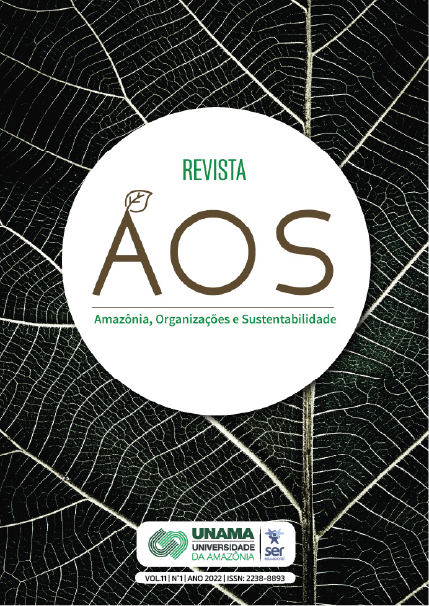Gerenciamento de Áreas Protegidas após a Publicação das Metas de Aichi: revisão de escopo ## Management of Protected Areas after the Publication of Aichi Targets: scope review
DOI:
https://doi.org/10.17648/aos.v11i1.2451Palavras-chave:
Gerenciamento de áreas protegidas, Co-gerenciamento, Metas de Aichi, Revisão de escopo.Resumo
O gerenciamento de áreas protegidas é suscetível à influência de fatores socioeconômicos, ecológicos e institucionais. No aspecto institucional um dos fatores que tem influenciado diretamente no gerenciamento desses espaços é a publicação das Metas de Aichi que estabeleceram a necessidade de expandir a cobertura e o gerenciamento eficiente e equitativo das áreas protegidas existentes no mundo. A literatura sobre gerenciamento de áreas protegidas apresenta-se fragmentada, de modo que é deficiente de estudos que forneçam uma visão geral das principais características da produção cientifica sobre essa temática. Nesse sentido, o objetivo dessa revisão de escopo foi descrever a produção científica que discute gerenciamento de áreas protegidas após a publicação das Metas de Aichi. Foram realizadas buscas nas bases de dados SCOPUS e Web of Science, coleção SciELO Citation Index, e após demais etapas da revisão de escopo, foram analisados 32 artigos de 21 periódicos. Os resultados indicam que o gerenciamento de áreas protegidas tem caráter transdisciplinar e tem recebido contribuições, principalmente, das Ciências Ambientais, Ciências Agrárias e Biológicas, e Ciências Sociais. Os periódicos que mais têm publicado sobre esse assunto são PARKS e Biological Conservation. A maioria dos objetivos dos artigos analisados buscavam “analisar” ou “avaliar” a eficácia da gestão. Além disso, foram identificados quatro grupos de países que têm estudado esse assunto em coautoria: grupo 1 – Austrália, Bangladesh e Laos; 2 – Reino Unido, Brasil e Tailândia; 3 – Dinamarca e Estados Unidos; e grupo 4 – Alemanha e Suíça.
Abstract
The management of protected areas is susceptible to the influence of socioeconomic, ecological and institutional factors. In the institutional aspect, one of the factors that has directly influenced the management of these spaces was the publication of the Aichi Goals that established the need to expand the coverage and efficient and equitable management of the protected areas in the world. The literature on management of protected areas is fragmented, so that it is deficient in studies that provide an overview of the main characteristics of scientific production on this theme. In this sense, the objective of this scope review was to describe the scientific production that discusses the management of protected areas, after the publication of the Aichi Goals. Searches were performed in the SCOPUS and Web of Science databases, SciELO Citation Index collection, and after other stages of the scope review, 32 articles from 21 journals were analyzed. The results indicate that the management of protected areas has a transdisciplinary character that is studied mainly by environmental sciences, agrarian and biological sciences, and social sciences. The journals that have published this subject the most are PARKS and Biological Conservation. Most of the objectives of the analyzed articles sought to "analyze" or "evaluate" the effectiveness of management. Four main groups of countries that have co-authored this subject were also identified: group 1 – Australia, Bangladesh and Laos; 2 - United Kingdom, Brazil and Thailand; 3 - Denmark and the United States; and group 4 - Germany and Switzerland.
Downloads
Publicado
Edição
Seção
Licença
Autores que publicam nesta revista concordam em manter os direitos autorais e concedem à revista o direito de primeira publicação, com o trabalho simultaneamente licenciado sob a Licença Creative Commons Attribution (CC-BY) que permite o compartilhamento do trabalho com reconhecimento da autoria e publicação inicial nesta revista.
A Revista AOS compromete-se a contribuir com a proteção dos direitos intelectuais do autor. Nesse sentido:
- adota a licença Creative Commoms BY (CC-BY) em todos os textos que publica, exceto quando houver indicação de específicos detentores dos direitos autorais e patrimoniais;
- adota software de detecção de similaridades;
- adota ações de combate ao plagio e má conduta ética.


